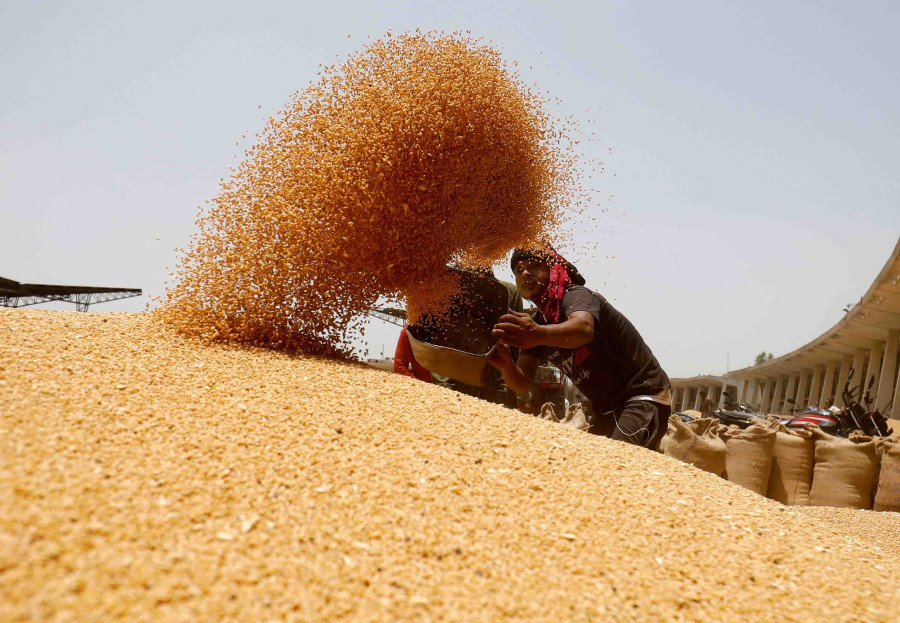Money
85 percent of flour mills shut after India restricted wheat export
India imposed a ban on wheat export on May 13 last year after unseasonably hot weather affected the wheat crop sending local prices soaring.
Krishana Prasain
The eight-month-long ban on the export of wheat by the Indian government has forced 80-85 percent of flour mills in Nepal to shut down.
Flour producers said that the ban has also created a shortage of refined flour and wheat flour in the market.
Dinesh Kumar Agrawal, senior vice president of the Nepal Flour Mills Association, said that domestically produced wheat is sufficient to operate a flour mill for five months only. “For the remaining months, producers are dependent on imported wheat.”
India imposed a ban on wheat export on May 13 last year after unseasonably hot weather affected the wheat crop, sending local prices soaring and also amid rising food security risks to India.
According to Indian media, the Indian government is reluctant to lift the ban soon due to the increased price of wheat, low stocks of wheat and new harvest arriving in the market only towards the end-march.
Agrawal, who owns Shiva Shakti Food Industries in Tandi, shut down his factory around 20 days ago due to the shortage of wheat.
“I have a small stock of wheat remaining,” he said. It will take more than 3-4 months for the new harvest to come. Until then, my mill will remain closed.”
Agrawal’s mill was producing 200 tonnes of flour daily.
According to him, the price of flour increased after India’s export restriction.
Before India’s restriction, a 50-kg bag of refined flour used to cost Rs3,200 to Rs3,300. After the ban, it jumped from Rs4,800 to Rs5,000.
The price is almost double in the retail market.
The flour producers met with the Minister of Industry, Commerce and Supplies and the government’s secretary more than 20 times requesting them to talk with India to open the export. “But we have not heard any concrete from them,” Agrawal said.
According to the association, Kathmandu consumes 2,100 tonnes of flour daily where 80 percent is refined flour and 20 percent wheat flour.
There are 38 flour mill members in the association. The flour mills provide refined flour as a raw material for industries making biscuits, noodles and the bread among others.
Each flour mill has an investment of around Rs600 million and they provide employment to 50-60 people, said Agrawal.
Agrawal said that Nepal has been importing wheat mainly from India as it is cheaper than importing from other countries.
According to the Department of Customs, wheat imports declined by 98 percent in the first six months of the current fiscal year, which ended in mid-January. The country imported 1,895 tonnes of wheat worth Rs66 million.
India has set a quota of 50,000 tonnes for Nepal.
The 27 flour mills have applied for the quota, said Urmila KC, undersecretary of the Ministry of Industry, Commerce and Supplies. The mill operators are in the process of bringing them, she said. “Around 30,000 tonnes is coming soon.”
“But the 30,000 tonnes will not even last for 15 days,” said Agrawal, adding that they need 200,000 to 250,000 tonnes currently to fulfill the market demand and check the price.
Purushottam Ojha, former commerce secretary, said that the Nepal-India Treaty of Trade has provisioned that if any country bans the export or import of goods or imposes a quota, the restriction can be lifted at the request of one contracting party. “Observing the necessity of demand, government-to-government talks are needed.”
“It has been around three weeks since our Bhairahawa manufacturing unit shut down due to the lack of flour, one of the major raw materials for the production of the biscuit,” said Hom Nath Neupane, CEO of Nebico Group. “We need 42 tonnes of flour daily to produce biscuits, but we are getting around 12 tonnes,” he said.
The three manufacturing units of the company in Kathmandu are operating, Neupane said. “But it also might get shut down soon because of the lack of flour,” Neupane said.




 20.12°C Kathmandu
20.12°C Kathmandu














